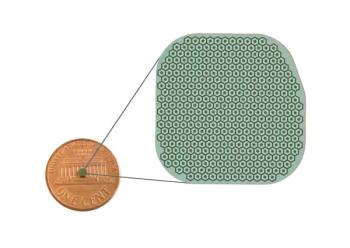
Melatonin has potential to reduce risk of age-related macular degeneration
Researchers examined data of more than 200,000 people, 121,523 of which had no history of AMD.
A team of researchers from the Case Western Reserve University School of Medicine and the Cole Eye Institute have found that melatonin, an over-the-counter supplement to help people sleep, may also reduce the risks of
The researchers examined data of more than 200,000 people, some at an early stage of the disease and some without age-related eyesight issues. Their research was published in JAMA Ophthalmology.1
The researchers set out to study the link between melatonin use and the risk of the development or progression of AMD.
The cohort study included 121,523 patients with no history of AMD, aged 50 years or older. Taking melatonin was associated with a decreased risk of developing AMD.
Moreover, among 66,253 patients with preexisting nonexudative AMD, melatonin supplementation was negatively associated with the rate of progression to exudative AMD.
“These findings provide a rationale for expanding clinical research on the potential therapeutic efficacy of melatonin in preventing AMD development or its progression,” the researchers wrote.
According to the study, melatonin has been shown to block several processes known to mediate AMD. It is not known whether melatonin can confer benefits against AMD.
The retrospective cohort study accessed data from TriNetX, a national database of deidentified electronic medical records from both inpatient and outpatient healthcare organizations across the US, between December 4, 2023, and March 19, 2024.
The study looked at data from patients aged 50 years or older, 60 years or older, and 70 years or older with no history of AMD (AMD-naive group) and with a history of nonexudative AMD (nonexudative AMD group) were queried for instances of melatonin medication codes between November 14, 2008, and November 14, 2023.
The researchers then classified the patients into either a melatonin group or a control group based on the presence of medication codes for melatonin. Propensity score matching (PSM) was performed to match the cohorts based on demographic variables, comorbidities, and nonmelatonin hypnotic medication use.1
According to the study, the presence of at least 4 instances of melatonin records that each occurred at least 3 months apart.
The researchers found that after PSM, the melatonin and the control cohorts were compared to evaluate the risk ratios (RRs) and the 95% CIs of having an outcome. For the AMD-naive group, the outcome was defined as a new diagnosis of any AMD, whereas for the nonexudative AMD group, the outcome was progression to exudative AMD.
Study results
Among 121,523 patients in the melatonin-naive group aged 50 years or older (4,848 in the melatonin cohort [4,580 after PSM; mean (SD) age, 68.24 (11.47) years; 2,588 female (56.5%)] and 116,675 in the control cohort [4,580 after PSM; mean (SD) age, 68.17 (10.63) years; 2,681 female (58.5%)]), melatonin use was associated with a reduced risk of developing AMD (RR, 0.42; 95% CI, 0.28-0.62).1
Among 66,253 patients aged 50 years or older in the nonexudative AMD group (4,350 in the melatonin cohort [4,064 after PSM; mean (SD) age, 80.21 (8.78) years; 2,482 female (61.1%)] and 61,903 in the control cohort [4064 patients after PSM; mean (SD) age, 80.31 (8.03) years; 2,531 female (62.3%)]), melatonin was associated with a reduced risk of AMD progression to exudative AMD (RR, 0.44; 95% CI, 0.34-0.56).1
The researchers also found that the results were consistent among subsets of individuals aged 60 years or older (AMD-naive cohort: RR, 0.36 [95% CI, 0.25-0.54]; nonexudative AMD cohort: RR, 0.38 [95% CI, 0.30-0.49]) and 70 years or older (AMD-naive cohort: RR, 0.35 [95% CI, 0.23-0.53]; nonexudative AMD cohort: RR, 0.40 [95% CI, 0.31-0.51]).
The researchers pointed out in the study that additional research is needed to validate the results as other factors could also play a part in the disease such as smoking or access to healthcare.
“Melatonin use was associated with a decreased risk of development and progression of AMD,” the researchers concluded in the study. “Although lifestyle factors may have influenced this association, these findings provide a rationale for further research on the efficacy of using melatonin as a preventive therapy against AMD.”
Reference:
Jeong H, Shaia JK, Markle JC, Talcott KE, Singh RP. Melatonin and Risk of Age-Related Macular Degeneration. JAMA Ophthalmol. Published online June 06, 2024. doi:10.1001/jamaophthalmol.2024.1822
Newsletter
Want more insights like this? Subscribe to Optometry Times and get clinical pearls and practice tips delivered straight to your inbox.




























